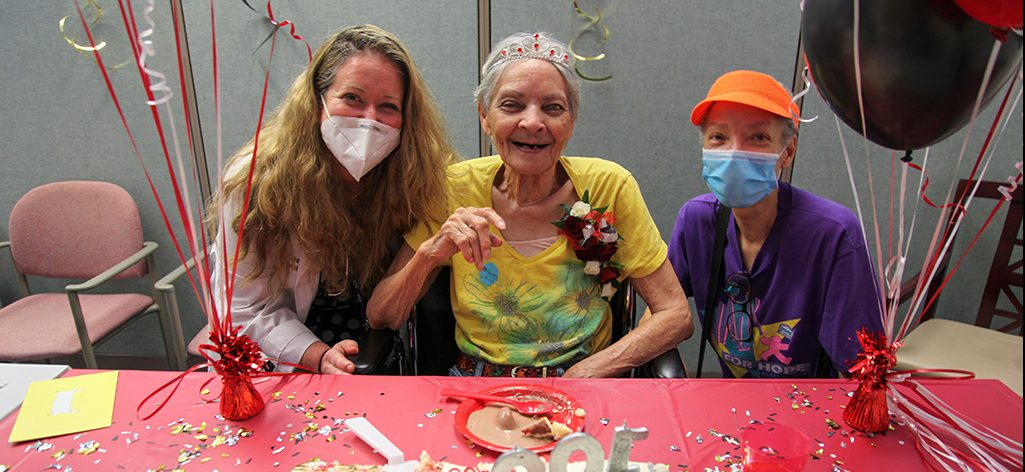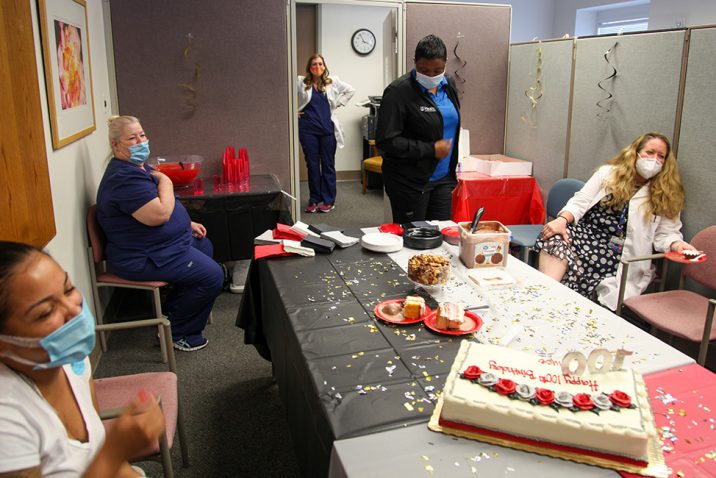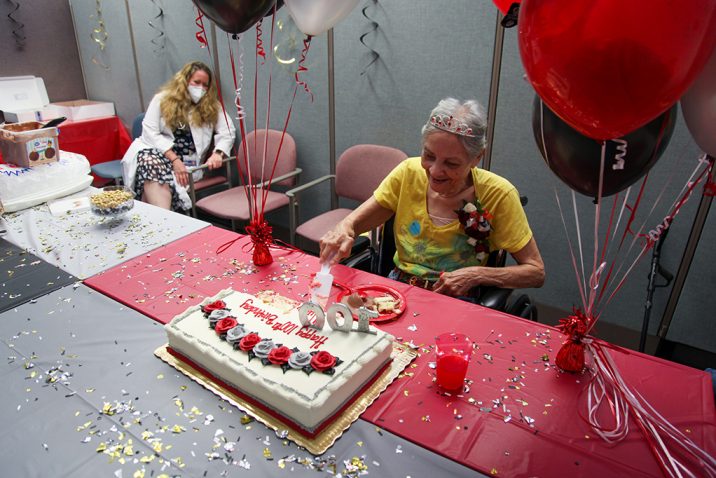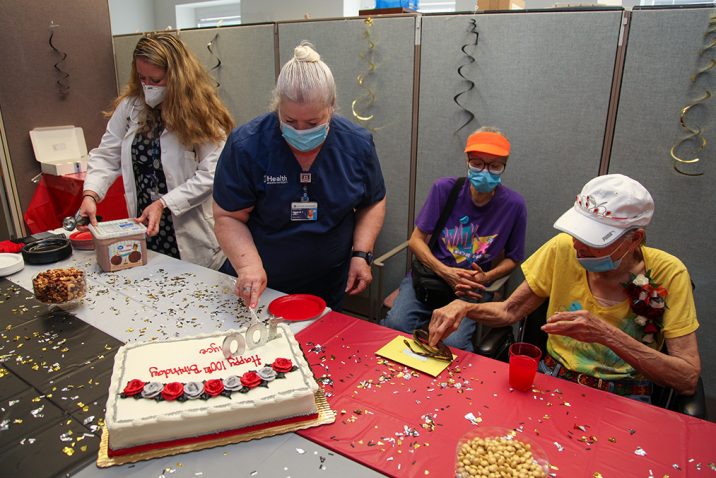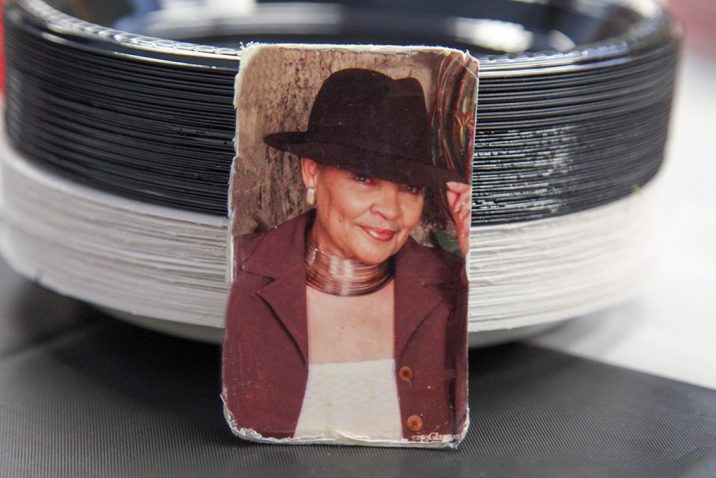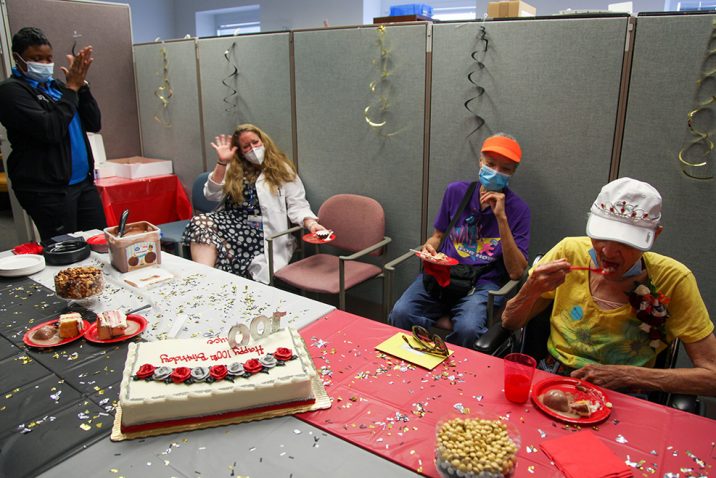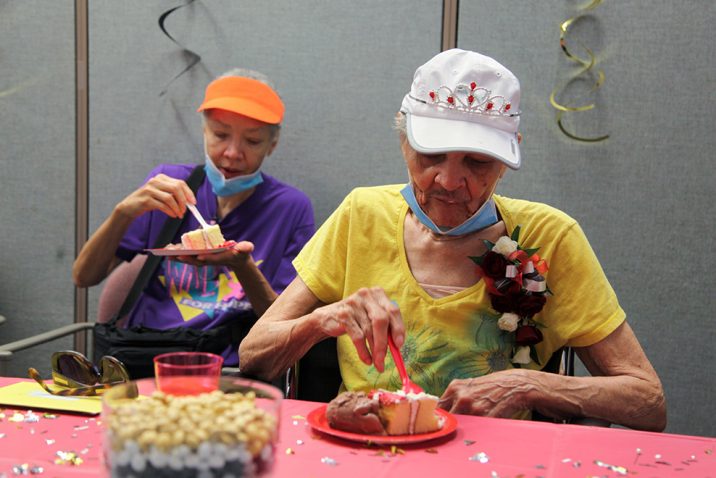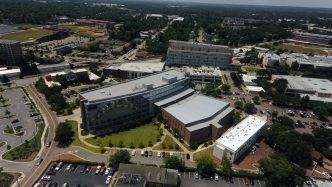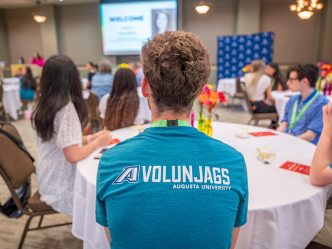Dr. Wanda Jirau-Rosaly joked with her patient, Alyce Simpson, as they were sitting at a table in the Geriatric Medicine clinic enjoying birthday cake and ice cream.
“I’ve been planning this birthday party for three years,” said Jirau-Rosaly, a geriatric physician.
“I know, you just rushed me here,” quipped Simpson, who was the guest of honor celebrating her 100th birthday.
Simpson’s actual birthday was June 4, but Jirau-Rosaly had been recalled to active duty because of the COVID-19 pandemic. Jirau-Rosaly knew she was going to find a way to celebrate her first patient who reached 100.
“I have been treating Mrs. Simpson since 2017; initially she was not too keen about seeing a physician,” said Jirau-Rosaly, who worked at Fort Gordon for eight years, three of which were active duty before arriving at Augusta University Health in 2017.
“Her daughter always brings her. She is a spicy one and always has great stories about the time she was growing up. I listened to her stories and gave her space to tell me what she wanted. Since then, I absolutely love seeing Mrs. Simpson. She always brightens my day.”
Geriatric nurse Elizabeth Thompson has worked in the department for 21 years and Simpson is the second 100-year-old to come through. When they started caring for Simpson, who has dementia, they managed her care with medications and did positive reinforcement with her and her family.
“She’s been able to stay at home with no personal home care or nursing homes,” Thompson said. “She has great support from her family. Dr. Jirau-Rosaly and Alyce have a great connection.”
Simpson was born and raised in Augusta. Born to a once-enslaved father, she is the only living alum from the Haines Normal and Industrial Institute, which was established by Lucy Craft Laney and chartered in 1886. According to georgiahistory.com, it grew to include a kindergarten to junior college curriculum, the Lamar School of Nursing, and a teacher training program. The institute, named for benefactor Francine Haines, also served the Black community as a cultural center before its replacement in 1949 with the present Laney High School.
Simpson was one of five Black school crossing guards on Twiggs Street, and as one story goes, an Army caravan would try to come through and she would make them wait until the children crossed.
“If they tried to go through, I’d get right in the middle of the road and make them wait. That made them mad,” she said.
Her daughter, Norma Simpson, said she was the neighborhood mom, often feeding or donating old clothes to those who didn’t have enough.
“Mama protected me, and in a lot of ways I was sheltered from a lot of stuff, so being an adult going out to work it’s like a totally different world,” said Norma, who grew up with five brothers and one sister. “My dad died when I was young, so mom was mom and dad to us. But she not only raised us, she raised other people in the neighborhood. She was always looking out and doing for not only us but others … she literally put herself last.”
Norma Simpson said when her mother would “go on vacation,” she would hide behind the couch and read a book or poetry. Alyce Simpson attended Augusta College and worked at the Wallace Branch Library. She was also the first Black person to drive the region’s bookmobile.
“She called poetry a form of entertainment,” said Norma, who then began reciting some before her mother jumped in and finished the poem.
Faculty and staff from the Medical Office Building dropped by with well-wishes for Alyce. Norma was grateful for the party, especially since “the morning didn’t start out great.”
“It means quite a bit to see mom light up that way that she does …. It was a delightful surprise,” Norma said. “My heartfelt thank you … because watching her and enjoying the cake and ice cream and cutting the cake … It’s really, really neat.”
Jirau-Rosaly and Thompson credit the relationships they had with their grandmothers with their desire to work with geriatric patients. Thompson said being able to celebrate an occasion like this was special because she considers all of her patients as family.
“I have a great relationship with my patients and their families,” Thompson said. “They know they can count on me to be supportive and try to do the best I can as a nurse to take care of them. I am their advocate. I will fight for them on any issues and go the extra mile to make sure they get what they need.”
For Jirau-Rosaly, the celebration is special, but the time spent with each patient means just as much if not more to the patients than to those working with them.
“Almost all patients I see want quality of life, and I think it is important to care for our older adults who have sacrificed so much and sometimes get forgotten,” she said. “Sometimes, the clinic visit is all the social interaction they have, and even though we can be having a rough time ourselves, we make sure that patients do not feel abandoned. Plenty of times they just want to be heard. As physicians we have to remember that not only are we trying to care for patients’ medical conditions but we also have to consider quality of life and patients’ desires.
“Even if they can’t speak, even if they have dementia, we have to make sure we find a way of communicating with them and making sure that their voices are still being heard,” Jirau-Rosaly added. “I have been asked before why I love geriatrics when my patients are going to die sooner. To me, it is extremely gratifying to take care of people in their adult life, to provide quality of care and compassionate care, and in the same manner respect our adults as older individuals who have lived through a lot. I learn so much from my patients and I am blessed to be able to work with them on a daily basis.”
 Augusta University
Augusta University
